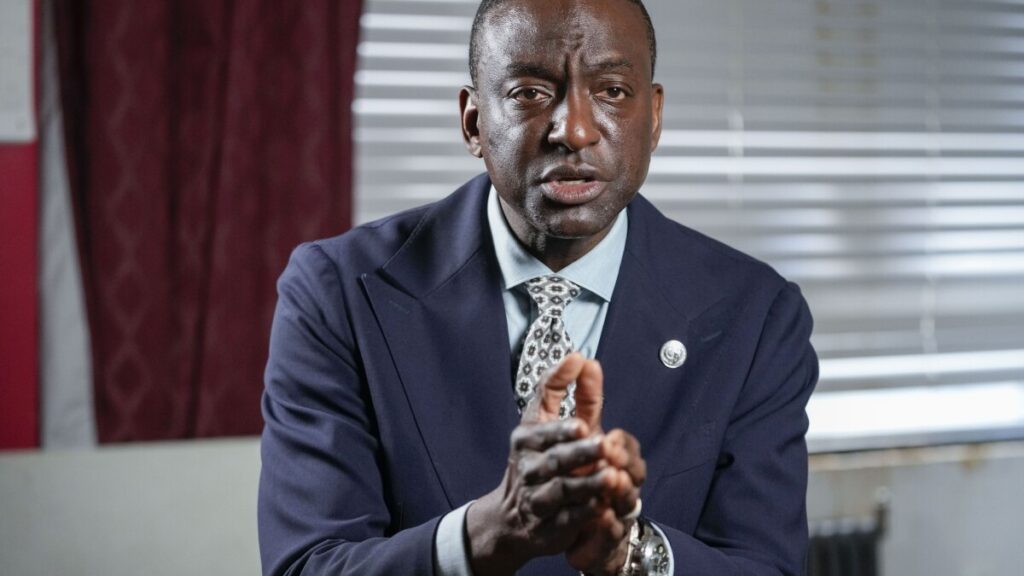
FILE - New York City Council candidate Yusef Salaam speaks during an interview with The Associated Press, May 24, 2023, in New York. (AP Photo/Mary Altaffer, File)
Exonerated “Central Park Five” member Yusef Salaam is poised to win a seat Tuesday on the New York City Council, marking a stunning reversal of fortune for a political newcomer who was wrongly imprisoned as a teenager in the infamous rape case.
Salaam, a Democrat, will represent a central Harlem district on the City Council, having run unopposed for the seat in one of many local elections playing out across New York state on Tuesday. He won his primary election in a landslide.
The victory will come more than two decades after DNA evidence was used to overturn the convictions of Salaam and four other Black and Latino men in the 1989 rape and beating of a white jogger in Central Park. Salaam was imprisoned for almost seven years.
“For me, this means that we can really be become our ancestors’ wildest dreams,” Salaam said in an interview before the election.
Elsewhere in New York City, voters will decide whether to reelect the Queens district attorney and cast ballots in other City Council races. The council, which passes legislation and has some oversight powers over city agencies, has long been dominated by Democrats and the party is certain to retain firm control after the election.
Races for Suffolk County executive and North Hempstead supervisor have been the most prominent, though the races are expected to have low turnout because they are happening in a year without federal or statewide candidates on the ballot.
“Keeping an eye on Long Island, which has been a little counterintuitive in its election outcomes the last few years with a mix of national and local issues, gives you a chance to see what’s playing in a typical suburb that’s not unlike the ones in Pennsylvania, Michigan, North Carolina, Virginia, Arizona, Nevada and other places that both parties believe are at play,” said Lawrence Levy, executive dean of the National Center for Suburban Studies at Hofstra University on Long Island.
Democrats lost in all four of Long Island’s congressional districts last year and have dedicated significant resources to the region for 2024. Republicans, bolstering campaigns with a focus on local issues such as crime and migrants, are aiming to hold onto the seats next year.
In the city meanwhile, Salaam’s candidacy is a reminder of what the war on crime can look like when it goes too far.
Salaam was just 15 years old when he was arrested along with Antron McCray, Kevin Richardson, Raymond Santana and Korey Wise and accused of attacking a woman running in Central Park.
The crime dominated headlines in the city, inflaming racial tensions as police rounded up Black and Latino men and boys for interrogation. Former President Donald Trump, then just a brash real estate executive in the city, took out large ads in newspapers that implored New York to bring back the death penalty.
The teens convicted in the attack served between five and 12 years in prison before the case was reexamined.
A serial rapist and murderer was eventually linked to the crime through DNA evidence and a confession. The convictions of the Central Park Five were vacated in 2002 and they received a combined $41 million settlement from the city.
Salaam campaigned on easing poverty and combatting gentrification in Harlem. He often mentioned his conviction and imprisonment on the trail — his place as a symbol of injustice helping to animate the overwhelmingly Black district and propel him to victory.
“I am really the ambassador for everyone’s pain,” he said. “In many ways, I went through that for our people so I can now lead them.”
In a more competitive City Council race Tuesday, Democrat Justin Brannan faces off against Republican Ari Kagan in an ethnically-diverse south Brooklyn district. The race has become heated as the candidates neared Election Day, with the pair sparring over the Israel-Hamas war and New York’s migrant crisis.
In a slight that symbolized the tension between the two men, Brannan recently tweeted a photo of a ribbon cutting ceremony that he and Kagan attended, but the image had Kagan’s face blurred out.
Statewide, New Yorkers will be voting on two ballot measures. One would remove the debt limit placed on small city school districts under the state Constitution. The second would extend an exclusion from the debt limit for sewage projects.





